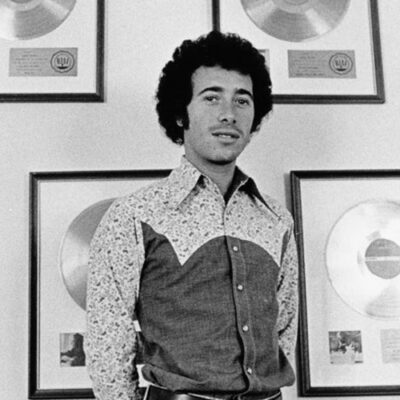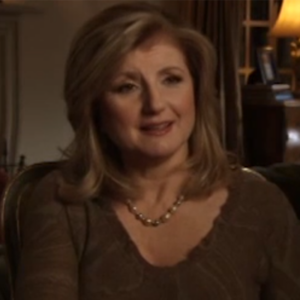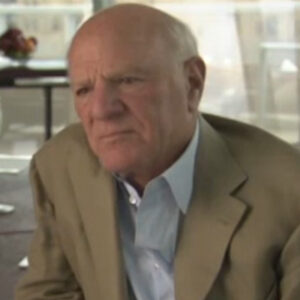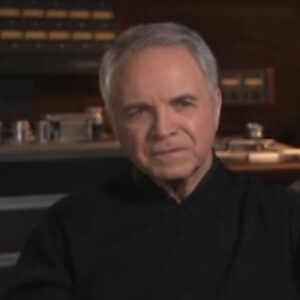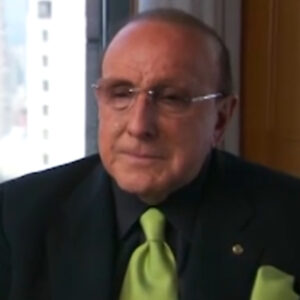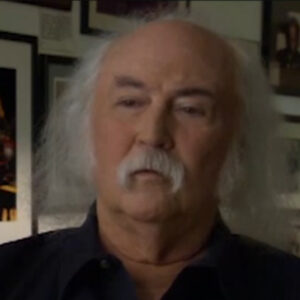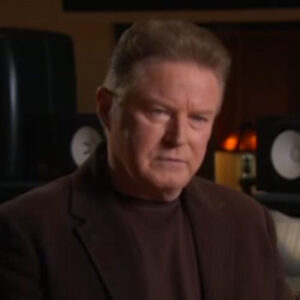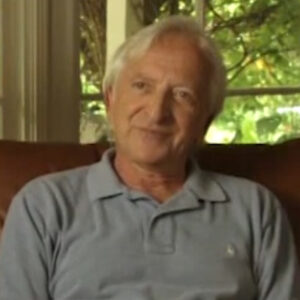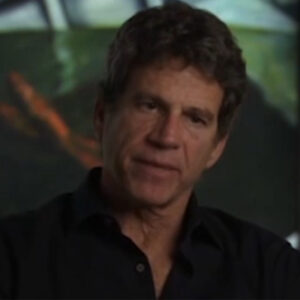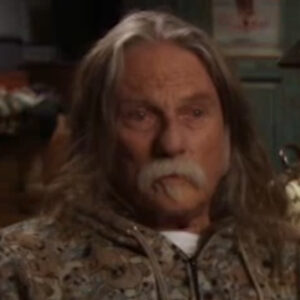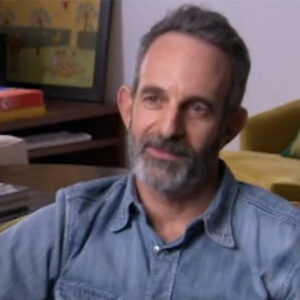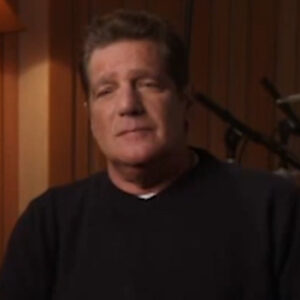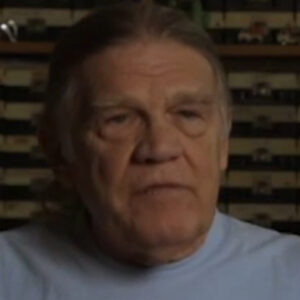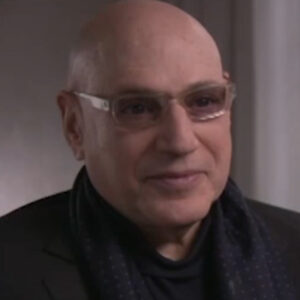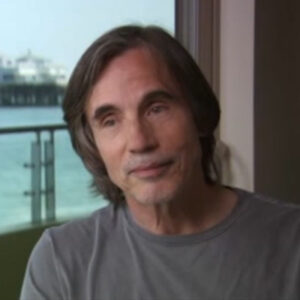Speaker I applied for a job at William Morris and I had a little pull, my cousin was in the business.
Speaker He was a fairly well-known, powerful manager, and they told me they were gonna hire me and they strung me along for six weeks. And then they called and they said that I wasn’t qualified. I had a 4.0 from Boston University. My whole life was about show business. And there I was crying in my kitchen with my mother. And I went to work at Gimbels and. Three weeks after I was at Gimbels, they promoted me and the night before I was to receive my promotion in front of the whole staff of Gimbels. I got a call from GHC, which was General Motors Corp., which is now ICM, that I could start at one fourth of what it was making it Gimbel’s in the mailroom. And I immediately took the job was always my dream to work in the mailroom of an agency that the mail.
Speaker Now, I don’t know what the mailroom is about today, but in 1962, the mailroom was the place to start to get an overview of the entertainment business. And you delivered mail and you stayed and wrapped Christmas presents, you know, went and picked up somebodies laundry, anything anybody wanted you to do. And. I went to school at night when I was in the mail room to learn shorthand and typing. I picked out an agent that I wanted to work for. Convinced his secretary to quit after I got my degree in typing. And she quit. Set up an appointment. And I begged him for a job and he made me his assistant. And then you’re an assistant and you’re an assistant agent. Then you were a junior agent and you’re an agent. Then you’re on the board of directors and then you’re vice president and then you leave.
Speaker That’s good to know.
Speaker I got oh, I started the training program.
Speaker I met David through a friend, Joel Dean, outside the William Morris office after work.
Speaker Like about seven o’clock on my way home.
Speaker He had wanted Joel to introduce us. And we just met in the street.
Speaker Yada, yada, yada.
Speaker You know, he had left William Morris. He had left William Morris and he had less left. Ashley famous. And he decided. That the two of us should be partners and that I should leave ICM and.
Speaker He is always right in the long run. So I convinced him to come to ICM and they made his first senior vice presence and put us on the board of directors. He lasted one year and I last a year and I have.
Speaker Yeah, well, I have to wonder, wait a second. Was it C.M.A and then it became I saw him. Yeah, yeah it was GHC when we started all the way inside.
Speaker OK, so let’s. Yeah, I. For some reason I had completely forgotten.
Speaker Did you work with Dave.
Speaker No, we were in separate mail rooms. So he wanted for me to leave. What was it then, C.M.A or ICM was a matter of months or GHC it was one of them. And I convinced him to come to whichever the name of the agency was. And he did.
Speaker And they made us senior vice presidents and put us on the board of directors. And we were very young.
Speaker He lasted a year. I lasted a year and a half. And he was right. He kept saying, why do you want to be an agent when there’s so much money to be made? In other areas of the business, David always turned out to be right.
Speaker What was he like in those days?
Speaker Same. Same, but younger.
Speaker Now tell us more.
Speaker Let’s start, I think. What did you, David, have? What are your first impressions?
Speaker Sort of almost like a mirror image.
Speaker We were both physically very similar. We were both born in Brooklyn. We both were fascinated with show business. We both wanted everything. And we were like two peas in a pod.
Speaker That’s wonderful. We’ve talked about what you’ve had in common.
Speaker How did that? Having so much in common effect your relationship professionally and personally.
Speaker Well, we really. Never worked a lot professionally. We worked somewhat together when he came to the agency. But we did very few things together. We I managed an artist on his label that we got into a huge fight about in 1970. And you would never have heard of her. And then we did one successful project together. Joan Rivers comedy album. And basically, we have kept business separate.
Speaker Sometimes that’s the key to a good friendship. What was it like, you’re both rising stars in the.
Speaker It’s all ahead of you. Just kind of give a sense of that time. What is David in that time? How is he making his mark on the world when he only last? I see him for years because he had bigger goals. What are his dreams?
Speaker I think his dreams were exactly what he accomplished. Exactly what he accomplished. I mean, I think that Dave wanted to be the godfather of the entertainment business. I think he was smarter than everybody else. And I think he knew that he was smarter than everybody else in the movie business. The music business. The publishing business. And I think David had a goal. And all of it has been realized. And the rest is history.
Speaker It’s almost impossible to talk about why somebody so smart, but. Historian Michael Collins came from a background knowing what was I think his mother may have prepared him a little bit.
Speaker I mean, his mother idolized him. He was King David, not just David. And I think she used to tell David all the time, you can do anything you want to do and you will do anything you want to do. And David was the most tenacious person that I had ever met when he wanted to do something. He got it done.
Speaker We talk to you about his childhood. Sure have. How would you start? Where do you say you?
Speaker Well, he was born to a. Fairly poor family, I would say his mother was a brasier and girdle owned brasier and girdle store.
Speaker I don’t think Dave was particularly close with his father.
Speaker He had an older brother, Mitchell.
Speaker And.
Speaker I think David knew that he wanted out of Brooklyn, wanted out of being poor, wanted to be somebody, and was motivated enormously to have a lot of money.
Speaker Why? Why? Well, he said this. Why did you? David asked a number of people to go into business with him, I think with first. And then he asked Clive Davis, Oh, I don’t know.
Speaker And then eventually it ended up going into business without it. With Elliott. Yes. Did you invest? No. No. True. Yeah. So tell us your impressions of Ellie.
Speaker Well, it is a good time. Good old boy. Always with a smile on his face. Nice. Happy. Happy go. Lucky became very close with the musical clients that he represented. And I believe he’s still doing it today.
Speaker How did he and David worked together?
Speaker I think David made the deals and Elliott took care of the clients when there was a big problem. David would get involved. But David knew very early on that Agent ING and management was not what he wanted to do. He knew that it was the service business. He knew that you didn’t build up a lot of assets in the service business. And David wanted to be. Wealthy.
Speaker That’s interesting because he had. That’s everything I’ve read. You talk with people that he. When he started with Laura Nyro.
Speaker In tents, devotion, extraordinary devotion. I mean. He was as devoted to Laura Nyro and believed in her music and her talent as much as anybody has ever believed in anybody’s talent. And he idolized her. And put her on a pedestal.
Speaker Yes, he said again. I left there.
Speaker He idolized her. He put her on a pedestal. He took care of her. He nurtured her. He loved her. He it that. Yes. Yes, she did love him. She loved him very, very much. They were like soulmates. We presented Laura Nyro and Tiny Tim at my house. I think, oh, my God. 1969. And we had. You know, everybody who is in L.A. at that time. I know the Smothers Brothers was there. Janis Joplin was there. I had all the older agents, you know, from ICM. And I think we had William Morris, whatever that it was.
Speaker What did David do? I know what he did for everything.
Speaker David did absolutely everything for Laura, Nero handled her like she was. The queen of England, the most precious jewel on the planet. I mean, he actually would listen. To her albums at the time over and over and over, and say, can you believe the lyrics on this song? They are unarmed. Listen to this. Listen to this again. OK, I’ve heard this 50000 times already. You know, I mean, he thought the sun rose and set on more neuro.
Speaker I really do, because I’m paying more near me to get take it took somebody very special with a very special set of years. At that time. You see, I mean, I’m not saying that people love her kid.
Speaker But, I mean, he got it before she had a recording of she had all that stuff before she had all the cover records on the hit brackets for her career. What did he do for her career?
Speaker He made her CBS recording contract. He made sure that she played exactly the right places at exactly the right time, whether it was the troubadour in Los Angeles and that everybody that. You know, could move her career ahead. He actually got many of her songs recorded by other artists, including The Fifth Dimension, which was, I think the first big hits. Oh, he was relentless, totally relentless. Any artist that he could get to, somehow he was going to figure out how they were going to record one of four songs. And David. Owned the asset of her publishing with her and sold it for. At that time, a gigantic amount of money and. Made her a very wealthy woman at the time and made himself wealthy for the first time in his life.
Speaker So do you know the backstory on why when he started asylum, she did not sign it? Because I know it’s very hurtful to tell that story.
Speaker He was destroyed, totally destroyed. And it was the first. Time. That he said, I knew you could never really depend on an artist. And I know I do not want to be in the business of representing people, artists, talent that you’re at the mercy of. And he was very clear about it, very destroyed about it. I mean, heartbroken, sobbing why she did that? I have no idea. I don’t believe. That I ever discussed with her.
Speaker Well, there’s some speculation that. When David started, if she had been one of his only clients. And it is completely devoted and that she was.
Speaker This is why she was his only client.
Speaker And that when you started sailing, he was going to have other artists that she feared wouldn’t be as devoted to her. That’s what some people thought might be. When you have that kind of closeness. Or she just had always wanted to be. Clive Davis says she always wanted to be on Columbia and she wasn’t comfortable in Columbia.
Speaker I believe. That the reason was that she was on Columbia. She had always wanted to be on Columbia Records. Dave, it was definitely a proponent of that idea and filled her with that thought for years. And probably in its simplest common denominator analysis of it would be she wanted to be on Columbia Records. He convinced her to be on Columbia Records. He was thrilled. She was on Columbia Records. Now leave Columbia and come with me to asylum. And she made a very bad decision. Because she lost the one person who stood by her and made her records what they were.
Speaker I don’t think. Well, I don’t know. He should do New York, Canterbury, after he, David, were hurt.
Speaker No, I don’t think so. He did all this. No, there was no deal. So I think that would be I think she.
Speaker Did New York tend to bury. While David was still working with her.
Speaker So her career really kind of topped out and never went really. A lot of places after.
Speaker Well, Laura was a very special, unique talent. She was not really a mainstream talent. She sort of was not somebody that maybe belonged on at that time, The Ed Sullivan Show Hullabaloo shindig. You know, she was a very specific, coltish special talent.
Speaker But I.
Speaker Very odd. Laura was a very unique, odd girl. I knew her very, very well and really liked her a lot easier than I did at Carnegie Hall. I flew David asked me to come. I was in Mexico with Barry Diller. And he said, I really want you to come. This is an important night for us. And I flew from Mexico to New York and saw the concert, which was just from David. Thrilled beyond belief. He just gave birth. You know. He gave birth to his child.
Speaker You know, he said. That he said at that time. Can never want to be at the mercy of another of an artist like that, because it’s not subtree.
Speaker And yet when he started asylum, I mean that he went in to the relationship with Jose. So who was equally devoted to, I think. Wasn’t he? No, I mean, I know that’s a complicated. I directed so much.
Speaker I know, I know she’s a piece of work. But I didn’t like her very much.
Speaker But at that time, there was you know, she was she was a different person. She wasn’t the same person she is now. And they weren’t quite devoted to it.
Speaker Yes. I think that David and Joanie, there’s no question they were very, very close. They were good friends. They’d lived together. They shared a house in Beverly Hills together.
Speaker I don’t think it was the same thing. I mean, I think that David.
Speaker David learns a lesson. David never forgets anything.
Speaker David will always remember. Being what he felt abandoned. And.
Speaker Not treated well by somebody that he was devoting his life to. So I don’t think he would let that happen again. I mean, he’s had. Incidences that have hurt him with artists like Joni Mitchell, like Bob Dylan. I don’t think that’s it unless I’m forgetting. But those three lessons, he would never let that happen again. And. I don’t think he would have put himself in the position of letting it happen a second time after Laura.
Speaker How do you do that? Well, it was Roger. Yeah, yeah, yeah, yeah. The siren was all right.
Speaker Oh, so send us the question. The question is, did did David have the same kind of a relationship with Joni Mitchell as he had with Lord Era? Is that the question?
Speaker Yeah, no, I think we got close to that. Oh, yeah. Yeah. Yeah. Is that what I said? Was that he he learned a lesson and he was.
Speaker That’s what David learned, a lesson from Laura Nyro. And David never forgets. And it’s hard to get him to forgive. And he would never forgive himself for making the same mistake twice. Two smart.
Speaker You know, that’s so interesting. He’s. I’ve grown to like it a great deal. My heart goes out. When I read the stories of betrayal of him, my heart goes out. I want to go beat people up. He’s an emotional guy. He really is, and he’s an emotional person. He’s an ultra person. How can you, if you’re that kind of person, build that, motivate yourself? I would be able to prevent it.
Speaker I haven’t a clue how you can do that. You have to have the most willpower, the most discipline, which David has. I mean, he has it when he decides he’s going to lose 10 pounds. He is going to lose 10 pounds when he decides he’s not in good shape. And he’s going to exercise. He will exercise every single day, come hell or high water. He’s incredibly disciplined, incredibly goal oriented.
Speaker And he was hurt. He was not going to let himself be hurt again.
Speaker Controlling your emotions isn’t the same thing.
Speaker Do you know what? May be for some people that are geniuses. Maybe it is the same thing as losing 10 pounds, controlling your emotions.
Speaker When David talks are going back a little bit, when David when you convinced him to come to that time to see.
Speaker Looking to get out. He was looking to get out from the minute he came to work there.
Speaker He thought it was the most ridiculous thing. And I think I don’t know what he was thinking, but he said, this is this is insane. Why are we doing this? When we could be doing things and owning, publishing and owning copyrights and, you know, doing things that have assets.
Speaker We want to get close.
Speaker I think maybe he did. I think that he wanted to get around the environment of the movie business because David’s office was on that side of the whole Freddie fields.
Speaker If this was at the end of the hall. My office was at the other side.
Speaker And David would spend a lot of time with Freddie Fields and Freddie Fields was primarily in the motion picture area, motion picture stars. They became friendly.
Speaker Wait until the big story.
Speaker Oh, Lord. The first time. After David decided he was gonna do this, I took David up to the office in New York of C.M.A. I guess it was, and introduced him to Sam Cohn and David Begelman separately. We walk into David Peterman’s office and David goes right over to him, looks him in the eye and says something to this effect. I have admired you for being the most well known and respected liar in the entertainment business. I thought, oh my God, this is how we’re starting this relationship. I thought. And David Bloom and simply, like, made a gesture and a giggle. And that was the end of it.
Speaker Are you telling this story? That is hysterical. Today, Red got skinny.
Speaker Always, always. David has never been afraid of anybody.
Speaker Ever has to come from his mother.
Speaker Well, we’ll try. Well, we’ll get to that later. Let us talk about his mother here. What was what was his relationship with his.
Speaker I think it was a complicated relationship. I think David remembers it as very harmonious and she was totally, completely supportive. And he was King David and. He was the light of her eye, but I think it was more complicated. I think that she would lecture him a little bit. I think it would irritate him. I think it was a normal Jewish son and mother relationship.
Speaker I’ve heard that or read that she obviously she called him King David, but then when he became very successful, she was a little bit surprised. You know, when he said. So what is a marriage you do? And he said, I advise people on their careers. And she said, you know, I mean, I think he even tells us I think you tell a story. And I walked on the Barbara Walters thing. But when I mean, it was yes, it was a normal complicated. Father, son, mother relationship. They seem to go a little bit beyond that was very devastating. She died. We very well. You have it at the funeral. Yes. Can you talk about that?
Speaker David was deeply, deeply upset when his mother died. Really broken, crying, sobbing. We went to the funeral. Then we went, I think, to Mitchell’s house. We went somewhere to eat. The Jews. After a funeral, and then we went back to the house on Carbon Beach and he just sat on the steps of the porch a long, long time. Very, very upset.
Speaker It was something beyond anything, you know, I think I think normal.
Speaker I think that a Jewish son grieves his mother. One of the things when I was an assistant to Tony Ford, the man that I told you that I wanted to work for, I wanted to work for him because he put all the town from GHC on The Ed Sullivan Show. He was on vacation. Roy GERB and Norman Weiss called from London. Urgent call. The Beatles want to do The Sullivan Show and a deal has to be made. You should go over and speak to Ed Sullivan. Now, I want you to know I was an assistant. I couldn’t even take the shorthand that he was giving me, but I had become very friendly cause I spent every Friday night, Saturday and Sunday, all day at The Ed Sullivan Show. And I went over and met with Ed Sullivan. And Bob Practice was the producer and his son in law, and Jack Babb, who was the talent Booker and I actually made the first steel for the Beatles to be on The Sullivan Show. That was exciting.
Speaker That’s one of those cultural milestones. You know what we’re really talking about back here?
Speaker And. And that’s sort of where we left off.
Speaker I have one percent, which is a wonderful.
Speaker He only got one shot. David did not know when he died. What had happened to her family is that she.
Speaker Now, of course he did. His sister. Her sister was living with Sam.
Speaker And Maritz, Sam. My crazy family that she lost in the Holocaust.
Speaker Well, she knew that she had lost the family in the Holocaust. I think her sister and her would the two survivors. And then she met Sam and married Sam.
Speaker I’m not I’m not remembering this, Jessica, saying that David and David didn’t know this story, that what had happened to her family. She survived because she was away at the time when they raided the village.
Speaker And I think that she knew they were all killed.
Speaker I think she felt that stoned.
Speaker She felt that out later. She did not know what had happened.
Speaker And when she found out what had happened to her family, she wept. She had a nervous breakdown.
Speaker But I think she even. Told me. You know something, I can’t remember this really so but I think that she had told me. Sitting at the table in Malibu. That she had found out that her family was stoned to death. And she had left the village or something. I think she told me that. And then she said and then she got very sick when she found out.
Speaker But this is not not for sure, for sure.
Speaker So let’s.
Speaker When David decided to start asylum records on the suggestion of Ahmet Ertegun.
Speaker I mean, obviously, I’ve been wanting not to be an agent, to be his own boss, so why why did it take it telling him to start his own record company? For starters. All right.
Speaker Oh, I think the day that. Knew he was going to start his own record company and publishing company and own it and own the asset.
Speaker That one day he could sell rather than than taking commissions from autists.
Speaker So not to take anything away from Ahmed because Ahmed was a terrific supporter and mentor of David, but had Ahmed not told David to start a record company and a publishing company, David would have started a record company and a publishing company because he knew. Immediately after the Laura situation, he was going to own assets that he could improve, build and then sell. So.
Speaker So how did he know you? You did. I mean, I’m asking you. I don’t work in business with him, but being one of his closest friends, you were around for all.
Speaker When he started the site, I mean, you never had any down. Hugely successful.
Speaker Never. I never had any doubt that anything that David wants to do, he’ll do.
Speaker So that first group of artists that came to site. Just talk about that and his relationship with these artist.
Speaker Who are they? Neil Young. Crosby. Stills. Nash. Joni Mitchell. The Eagles. Jackson Browne.
Speaker So what, you gave it to these people?
Speaker I think that they were smart. Talented. Intelligence, not pop, not R and B. And I think that that was the music that he related to the most. And it was also the songwriter performer that was so popular at that time.
Speaker Well, they weren’t inside the main songwriter performers.
Speaker Well, really, this is a very.
Speaker Can you describe that difference? What was it about it? How did David manage it differently than other record companies have been managed?
Speaker Maybe the only thing that I can think of that may it was homey. It was a home spun record company where everybody was friendly. Jackson was friendly with Joanie. Joanie was friendly with Crosby, Stills, Nash and Young. They were all interwoven professionally. Personally, and it was not like a business business. It was more like a artistic. Evolution that turned into a real business.
Speaker That’s my take on it as well. But it changed the way artists manage their own careers.
Speaker These AP record companies say.
Speaker I don’t know if I actually know what I’m saying, but it’s there, but no, I mean, it changed course when David sold asylum in Geffen Records was a very different thing. But in the time of asylum, there were.
Speaker It seems that the ideas for the lack of a better word, because I don’t like the word hip. Asylum was one step in front of everybody else. With Joni Mitchell, the Eagles, Crosby, Stills, Nash and Young, Jackson Browne, Joni Mitchell. And it was an artistic almost, you know, revolution because it was fast. So it wasn’t really an evolution. And it was a different home spun record company.
Speaker Family.
Speaker Would they be the same age as all the ideas and very interwoven into their personal life and their careers, if they were a a group, a bunch of friends that, you know, made really smart intellectual music?
Speaker Now, before, when he was with look at management, before he started asylum and I guess some of these business things a little bit confused, but he was their manager and then he signed them to his record label. And as a manager, he did not have contracts with any of these people. And then Elliott took over. Look at management. I know there was some feeling that. That there were.
Speaker Some people thought that this is something if they didn’t have a contract with the management firm, why did they have to have a contract with the record company?
Speaker I think you have to have the record company by David, where there’s a blurring of the lines between management and agent and owning part of the publishing company. And some of that you weren’t supposed to do if you were the agent, but you could do as a manager. Yes. Yeah. But then a controversy.
Speaker Well, an agent. Their job is to secure authors and negotiate the best financial deal they can. And they are by the laws that govern them, bound to present every offer to the manager or the client. They also do not own a piece of the record company, not the record company. They don’t own a piece of the record contract and they don’t own a piece of the publishing. Managers are allowed to be partners under the laws that govern managements in the state of California. They can own a piece of the publishing. They can own a piece of the record contract. They can be partners with the artist.
Speaker David blurred those lines.
Speaker I’ve really. Can answer that? No. Because David was not an agent at the time at all, David had long left being an agent. He was an agent, then a manager and then the record company.
Speaker Well, you know, I just I thought he had one zero as a man, McLain already when you went to work with UNSCOM. Say that again.
Speaker Didn’t he have Lauren Zero as a management client already? By the time women when you guys went to work for CNN.
Speaker Yes. But he still had a 50 percent of her publishing. Yes. While he is an agent as well.
Speaker He had it prior.
Speaker In other words, if you became an age and you didn’t have to give up what you had in the past.
Speaker Would you say that again, because I think I stepped all over it because I know there are gonna be some people who are being racist and say that that was kind of a no, no, no, no, no, Dave.
Speaker It was Laura Nero’s manager and partner in her publishing before he came to CMA. So you don’t give up, you know, your first born when you go to work as an agency.
Speaker So why did they sell asylum? It was very successful. Well, first on this, I mean, maybe you could just say this. It was hugely successful. I mean, a lot of the records went know platinum and gold and immediately.
Speaker And it was very successful. I don’t think he I think my sense is that he began to. What did he sell yourself? Asylum 72.
Speaker And what year was the cancer scare?
Speaker Well, he had two years. And I think the sense is that he he started off.
Speaker He said, I never want to have more artists that can sit in a sauna with a bunch of people and sort of, you know, like four or five people. I never want to have more people, artists on my label that can fit into this thought.
Speaker And one of the reasons Clive didn’t go into business with him is that they’ve said you only want to have 10 clients who want it. You really want to set up a boutique agency. And from what I’ve read, a boutique racquet club.
Speaker Yes, boutique. Record company. And what I’ve read, it was incredibly successful because it had such equity or the right people on the label.
Speaker But they were a handful and they got a little tired of dealing with them. Crosby, Stills, Nash and the excesses run tours and, you know, trying to take care of people who wasn’t on drugs, which separated him from a lot of the artists.
Speaker And he also. Knew that he wanted to sell an asset. I mean, that’s why he started the record company, because he knew he would sell it. And Dave, it’s always been a genius when it comes to any kind of timing for financial things. And he got a. Or for that he thought was good. And he sold it and knew he would start it again.
Speaker The artist was surprised when he sold it.
Speaker I can’t remember. I honestly can’t. When was the cancer scare?
Speaker Later, it was seventy five and five every seven asylum, and before he started getting.
Speaker After he left and when did he go to Warner’s 70?
Speaker Oh, he went to Warner’s short stint years in the motion picture.
Speaker But seventy two to seventy five. What was going on?
Speaker Was he you know, he was the after Elektra Asylum Gurche. He ran that label. And it was very successful. So you basically had 70 to 75.
Speaker And did he moved to La Cienega?
Speaker Or was he on sunset both last year?
Speaker I think he moved La Cienega in that period.
Speaker You know, the House is here with, you know, not a house off to the office at sunset.
Speaker Oh, last year I mean, the electron. Yeah, yeah, he moved there. Exactly. I think in that period after saw the sign of the water.
Speaker So he stayed with asylum a lot, Drew. Seventy two to seventy five.
Speaker Yeah. I mean a different type of position in this race. At one point they were going to merge. Atlantic also with them.
Speaker Then that fell apart. And then eventually he kept making it. I mean, from what I can tell you, that making a bid to get over to the studio. And eventually he got a job, right? That makes sense. Oh, yes, it does. Also during this time.
Speaker Five days a week.
Speaker At the beginning of who is that guy, the dad is a moron.
Speaker I was go to that same psychiatrist. What was his name? Do you have his name? Barton. Well, certainly the g.g heart. Hard grouching. Yeah.
Speaker Growth would kick me out of itself, said your not working hard at all, you shouldn’t be here. You got fired.
Speaker He said to me, Dave, it’s working hard. You’re not working.
Speaker Why did they Why does anybody start analysis? You think you need to explore things and thoughts in your mind and what causes certain emotions and behavior and.
Speaker It’s talk about best share.
Speaker Okay. Describe that relationship. You read there where he met her. How did he fall in love with her? Oh, God.
Speaker I don’t think I was there. No, I don’t think I was definitely not there when he met her.
Speaker I was so. Yes. Oh, God. So I don’t know.
Speaker I mean, the funny. Wait a minute. She wanted into the rush. She was. The survivor is opening night on the Rock. So they met her when she was part of the rock roll. That’s USA, the Ronettes.
Speaker I’m not saying that there’s any back out when you first met Phil Spector when he was a kid. I mean, he was literally 17 until the 60s. And he came to visit his brother in L.A. and his brother’s wife. You said, you know, Frank, you married Phil Spector. So David got invited to get some recording sessions. And he met she was a cashier at that time.
Speaker Cheryl, who was the sheriff? She wasn’t sure, but not here. Cheryl. Yeah. I don’t know. Nothing happened. I didn’t really know. I was not into Roxy Optimized Roxy.
Speaker She’s very afraid not to be separated. He took one look at that. Now, there are some people who don’t think it’s not would have been possible, so.
Speaker I was not with David when he met Cher, but I remember he called me the next day and said I fell in love, I’m in love with Cher. What I was like. What are you talking about? He had been to the Roxy. She came in in some had. He was describing and I think he spoke with her for a long time that night.
Speaker And he started going out with her every night. And.
Speaker I think it was somewhere around Thanksgiving or Christmas because she drove to my house to meet him one night and. I knew share a little bit, but I didn’t know her well, and she had driven down Santa Monica Boulevard from CBS where she had just taped her show. So it was fairly late at night. And she comes in and she wants to borrow ten dollars or something because she wanted to buy a Christmas tree from this kid who was selling Christmas trees on Santa Monica Boulevard. And I fell madly in love with her. She took the ten dollars, went back to give this kid money because she knew the kid needed money. And I thought, oh, my God, this is the greatest girl in the world. And David was besotted with her. He thought she was fantastic.
Speaker Did you spend a lot of time with them together?
Speaker Yeah. I mean, I’m sure I did. I mean. I think they came over to my house a lot. Sometimes we would sneak in her dressing room at CBS.
Speaker Yeah, well, she’s going to give us an interview. I’m sure he’s going to talk about it as well. But she ended up breaking his heart.
Speaker Totally, totally broke his heart. He really was crushed when she broke up with him. I remember him crying on my bed and. I think he went to Brazil. To go on a vacation. He was so heartbroken.
Speaker Did did he really think they were going to get married? I don’t know.
Speaker I don’t know if he thought that they were going to get married. They were young. I mean, while she was married already. Maybe they weren’t that, you know. What year was it?
Speaker Seventy three, seventy three, so day that was 30.
Speaker Well, let’s so young. She was still she was going through a divorce, basically. Well, not yet. But he even advised her on your career. Yes. And can you talk a little bit about that, what he what he did for her career or whatever, he put together a special for her with Elton John and Bette?
Speaker Well, that was terrific and received great.
Speaker And.
Speaker They were a couple. You know, I don’t think that it lasted that long. But while they were together, they were a real couple. And. Do you know why she broke up with him? No. You know, I can’t remember if it was. Is it is it Arman?
Speaker Yeah. I mean, I should have said. All right.
Speaker Then I started managing share and Greg Orman.
Speaker You’re starting to manage Cher with a little bit of controversy. Yes.
Speaker I had thought David wanted me to manage share, which he may have now in retrospect, thinking about it, but he definitely did not want me to manage her after they broke up. And my partner at the time. Convinced me that was ridiculous. And one thing has nothing to do with the other. And Cher wanted me to manage her and I did manager.
Speaker When you read all these articles in you trying to do background research, you can hear about this dust up that David had with so-and-so and this and that sense of betrayal. And so-and-so is mad. He took this quiet away it. And I’m thinking this is probably just standard operating Hollywood procedure in Hollywood and electric business. That’s what you do. You read people’s clients. You do this, you you you make a good business deal. You its business. And somehow you’re able to separate the personal from the business. Is that true?
Speaker Is that the way it works? I think it’s the way it works sometimes I think that I think.
Speaker Hopefully we all grow up and change. And I think that, yes, there’s a lot of stealing people’s clients, agents, stealing other agents, clients, which is sort of acceptable in the business to some level. Managers are not supposed to. There’s an unwritten code. Managers are not supposed to steal other clients. Other managers, clients.
Speaker But I would imagine. When you’re young and you don’t know that friendship is much more important than. Business. That people will do things that they wouldn’t do when they mature. And I’m sure it’s the same in any business.
Speaker That’s very wise, very wise, because, you know, I mean, obviously, even you, David, had a number of serious subsidies to.
Speaker David and I had a fight over this artist in 1970. I cannot even remember what the fight was, but we did not talk for a year and then we had a fight. Nothing to do with business. In nineteen ninety five. Where we didn’t talk for 13 months.
Speaker Was that painful for you?
Speaker Very painful, very, very painful, because David and I, I would say, are really closer than brothers. We were very. I mean, a very unique, different kind of a relationship. You know, we can finish each other’s sentences.
Speaker When you were not speaking. That was very painful time for you. He ultimately forgave him for whatever it was that he was upset about. That seems like David takes this very, very serious.
Speaker Very, very serious. Dave, it is a very serious person.
Speaker And feels things.
Speaker You’re giving me a line reading. That’s hysterical. Give me that again. Give me money. Good.
Speaker I’m going to do it perfect. That’s curious.
Speaker I know. No, I’m not doing it. We’re rehearsing. I got the leidner. You.
Speaker David is a very serious person and fuels. Things very, very deeply.
Speaker I’m really getting that sense that did you get that? Yeah, no, no, no, I actually wouldn’t. But let me just say where we’re where I’m coming from. The thing I’m beginning to get it.
Speaker Disgraced businessman world smarter than everybody else wanted to make money, did all that. But that deep inside is a very vulnerable person and and is easily hurt, has been betrayed, has dealt with a lot of hurt, feels things very deeply. And it’s almost as if he brings the same kind of intensity to relationships that he does to business. And therefore he has a fair number of dust ups with people. I never another for that, you know, because he does feel things so deeply. He’s not a surface guy. And I think that’s kind of what I’m trying to get right now and how that’s affected him in business. And it’s affected you personally because it doesn’t do anything halfway.
Speaker Even things the same way that David knows what he wants in business, he knows what he wants from people who are his friends. And he’s very, very careful about it. And. Dave, it feels enormous angst and very emotional. He can be as, if not more emotional today. About a personal affront. Then a business situation. And David is not a surface person at all. David is not a silly person. David as a of doesn’t like. When people wassily with him, he is very dogmatic, very pragmatic and takes things very, very seriously, whether it’s business. Or personal.
Speaker And can we pick that up?
Speaker Sure. Don’t you have to have something to cut away, too? Yeah. Oh, really?
Speaker And David feels very intensely. Very, very deeply. Very emotionally.
Speaker Thank you.
Speaker You’re welcome.
Speaker Let’s talk a little bit about this movie that he stepped in and actually said this was apparently didn’t go terribly. Why do you think it did? Why do you think David is weak now, not his movie career, less successful than his career as an executive? He didn’t work out too well, in my opinion.
Speaker The reason that the movie, the very short stint that he did working for a major motion picture company didn’t work out, was because he wasn’t the boss. I mean, it’s as simple as that. David had become more successful than anybody else. I, frankly, was unaware of that. I mean, I thought that the press portrayed David in a very favorable light, almost always. I mean, I’m surprised to hear that there have been a lot of negative things written about him.
Speaker I don’t think recent I told him that he was younger and just getting started. There was a piece on it that was The New Yorker. And David was around for a lot of. It was just kind of dismasted.
Speaker That’s why it is kind of scary, because you have this journalist that I think I remember, but I thought I thought that was right, but I thought that was one of many good articles. One bad one.
Speaker Did you sense. My sense is that.
Speaker I’m so sorry that this book was devastating to him who wrote that book? Tom.
Speaker The book isn’t the book. I’m beginning to see in the book that there’s that he had an agenda. I don’t quite know what the agenda was.
Speaker And you can see it in just the choice of words. So we’re very careful in that book. We don’t you’re not using we’re not using it as a absolutely impeccable research tool. We’ve looked to see every quote, whether it’s actually a direct quote, where it comes from his own opinion.
Speaker So I think his agenda was he wanted to make a name for himself.
Speaker I think David was right to become weary of him after a while, which he did. And he didn’t stop anybody from talking to her, which is interesting. It took a lot of comfort, self-confidence to I think is taking a lot of self-confidence. For him to live up to allow me to make this film.
Speaker I think it’s the only program that he would allow to do it. I mean, because he’s a big fan.
Speaker Of American. Anyway, so very interesting, go back here. OK. So he wasn’t the boss. This is my boss.
Speaker I think he wasn’t the boss. I don’t think that he made final decisions. And I think it was. John Calley was there. And Ted Ashly. And if you know, David. You know, there’s not a lot of bull. You know, he makes a decision and he makes it on his instincts. Which are much more right than wrong. And I think he was working for people. And it didn’t work out.
Speaker Also, as I understand gathered, you just didn’t understand the Hollywood game that you lied to people. You don’t tell people that if you think I feel could be better. You know, that kind of thing. It was very direct because that’s what he was used to doing. And it was like, you know, all right.
Speaker There’s a famous Clint Eastwood story was saying, you’re thinking about the Clint Eastwood story.
Speaker But also I get on board and board meetings where they would look at and cut everybody and. How much money they thought something’s going to make. And I think it was the. Oh, Billy Jack’s at Billy Jack stuff. Remember that, right? And everybody said, oh, everybody wrote down a big secret. He wrote down a small fee and whoever was running the meeting was furious. He said, well, I don’t like it.
Speaker No good. You know, but I think Hollywood is built on.
Speaker I started to say exactly that, but then I figured you didn’t want me to say.
Speaker On your fancy, you show me. But it’s OK. It would get bleeped. Yeah. Oh, so you want me to say yes? I think I think one of the things I think that one of the reasons.
Speaker That it also didn’t work. Is that the motion picture industry is full of a lot. And David, that’s something he does and, you know, get into. In other words, do you like this film? No. And everybody’s jaw would drop. But then you go tell so-and-so to recut his film. OK.
Speaker What what do you think is some of David’s? So really important question. What do you think he would say are his proudest?
Speaker I would say the night that he came out at APL A. Saying that he was a gay man living in Hollywood. I would think the Dream Girls movie.
Speaker I would say asylum records.
Speaker It’s got a lot of accomplishments. I would say his art collection.
Speaker I would say. The boat, the rising sun. Which makes him happy.
Speaker And I would also say his partner, Jeremy, which is really the first. Long lasting relationship romantically. Companion that David has had.
Speaker This is wonderful. Terrific. David, everyone says that they have found a level of happiness in. Before that, a personal relationship.
Speaker You know, I think that both the boat and Jeremy have changed davits life enormously.
Speaker Can you.
Speaker He loves being on the boat. The boat is as luxurious as it could be. David loves to read. He reads incessantly on the boat. David loves conversation. So there are long conversations with the most interesting people in the world. Breakfast, lunch and dinner. David loves to watch movies. He gets the, you know, disc’s of all the movies. As soon as they’re finished in L.A., there’s a great screening room on the boat. And we watch movies at night. So combination of the most interesting people, the most luxurious, surrounding quiet time. Even though David would not like me saying this. I think he likes to control his environment. He is in control on the boat. And I think he is just happy on the boat. And then to have fallen in love with. Somebody like Jeremy, who is fantastic and makes a fantastic companion for him. He has the whole ball of wax and is relaxed and happy. I don’t think I’ve ever seen him get angry or mad on the boat. Coming out, the boat has a major calming effect on David.
Speaker What is it about water? Is there some special connection to one?
Speaker But he loves the ocean. He doesn’t go in it. I mean, I think that he’s lived in the house on Carbon Beach. I think 1973. And I would say he’s never been in the ocean. He would say he’s been in the ocean once or twice. But I don’t think so.
Speaker He doesn’t. Take the time to learn to swim. Which he should do. Does he have a.
Speaker Of course, does he have a swimming pool? He had several swimming pools and he has the ocean.
Speaker Can you say.
Speaker Does he have a swimming pool? He has several swimming pools and an ocean and the boat is always in the ocean where he is not.
Speaker Who’s who are some of the people who go on the boat?
Speaker Stephen and Martin, Tom and Rita Hanks, Marty Short and Nancy Short, Rupert and Wendy Murdoch, rum and oh no, I can do this.
Speaker You have to start over. What’s Rahm’s wife? I don’t know.
Speaker You think that big article in the Times yesterday, front page about his brother, about the R.E. Way from Lipton.
Speaker Oh, and his wife is so great. I can’t do this to her. Is someone looking it up? Sure. Sure.
Speaker There are all these people going to be there when you go to L.A.? No, no, no, no, no, no. It’s.
Speaker In other words, he invites certain people.
Speaker There’s going to be there when you go. I don’t know. He doesn’t tell you.
Speaker If I asked, he would tell me, but I had to keep exchanging e-mail. He told me he was going to London to see Tony Blair and he was going to Saudi Arabia.
Speaker The Darbyshire to be about the dogs excuse me, to be a beard biotics. I mean, so we’re emailing, I said having a good time hanging out with former prime ministers Chics. And he wrote back not just former. He gave me the guest list of the dead or you just next prime minister. I was at that dinner. It was so funny. I think he’s having the best time is the red light. It’s the sense I get. Definitely. Really not missing business a bit.
Speaker For this.
Speaker Amy Rahmon, Amy. Yeah, I think so.
Speaker I think so.
Speaker If you can do that again, it be great. I’m hoping that he’s going to let me interview with him on the boat. Oh, really? I’m hoping he hasn’t said yes yet. But we want to we’re going to endure the Malibu. And then I bought a mansion and then boats so important to him. I just want to get an interview. I don’t want to bother anyone’s guess what they want to be in the picture, because I know that’s a refuge for people. But I would really like to get interview with him on the boat.
Speaker Not just because I want to see some good enough. That’s a good enough reason.
Speaker Let me tell you that, because you will be shocked when you see this boat. You will be shocked. I mean, I’ve seen people that have been all around the world 20 times, and when they finished the tour of the boat, it’s like, oh my God.
Speaker This is not yet for the open, I’m just curious how many state.
Speaker Nine hundred and fifty six in help.
Speaker I can’t believe I’ve seen this before. Fifty three.
Speaker And nine. Nine, is not it. So every bedroom.
Speaker Every bedroom has. There all done the same. Except the master suite upstairs, which is the top floor. The whole top floor. Which David does not ever stay in. He doesn’t like big spaces. David likes small spaces and. What was I saying?
Speaker I think things are all the state rooms are basically the same.
Speaker They all have a king sized bed, two and tables, a card table, which is a room service table, a computer desk with a computer on it, a bar, too. Full size lodge, totally stone bathrooms. It’s it’s extraordinary.
Speaker How are you going to be honest?
Speaker I think we’re going to go for three weeks and then David Skinner and Jeremy are gonna come back to the Hamptons for a few weeks and then go again. This is.
Speaker I’d love to get seen with your data together, but he’s very wary of the camera. Making it seem like a contrived situation. He doesn’t even understand it. Every documentary he’s ever seen is totally contrived.
Speaker I mean, he loved the Bernstein film. He loved learning, rehearsing in Vienna for him. There’s a camera there, too. But I think what he’s saying is that I’m not really doing anything right.
Speaker I’m just it out. Well, that would seem contrived if you could talk him into letting Norriss going through a museum. It is a revelation. And having him talk about. I love. I think it would be great for him. Take a look at the whole art collection instead of just a look at his art collection and really understands art, you’d be waiting for people to see that. OK, OK. Just walking through the scene with whoever was to one we’re talking about here.
Speaker What else should we shoot? And what else about ideas. Nor is it.
Speaker I don’t think he would want it to look like he was part of making this happen.
Speaker So see that enough that now for making it very suspicious, David. Would you like to go to the museum this afternoon when you come see?
Speaker Oh, we’ll go to the museums. We’ll go to all.
Speaker We will basically do. Very little. Hang out at the house and go to someone’s house for dinner, or I’ll have people over for dinner. David is very self sufficient and enjoys. His and his time alone and reading. He loves to read.
Speaker Let’s go. Let’s go back. What does David like to do?
Speaker Everything. But, I mean, he goes through cycles. He went through a cycle of reading every biography and autobiography ever written. And that last four years. That was several years ago. Now he’s in two. Mystery novels, crime stories, detective stories. I even read these junk.
Speaker He must keep. I mean, he must be ferrymen non-fiction as well. I mean, he’s terribly well. Now, what’s going on in the world?
Speaker Dave, it reads every newspaper and every magazine and now. Everything on the Internet. I mean, he knows every site. He has more information in that head. I mean. Seriously, you can ask him about any apartment in New York. Or any house in L.A. or Malibu. He will know the square footage. The architect, how much they are asking what the original price was, how much it is reduced by. He just is a total sponge of information.
Speaker Does he have the time gets up very early. David wakes up at four thirty five.
Speaker And the minute he wakes up, he is out of bed. Reading the newspapers, reading the magazines. Looking at the computer.
Speaker You know, that’s interesting, let’s talk about when he when he thought he was dying. Because that’s interesting. Born babies said that after that. He said he really changed his life. He became a person who went to bed early and got up early. That was a big change in his life. I think he meant that as a metaphor it to some degree. But you were around when David was diagnosed with bladder cancer and thought he was dying for a couple of years. Right. Can you talk about that whole that whole time, that whole experience, what it was like?
Speaker He was very frightened.
Speaker I think that that was one of the reasons that he didn’t go back to work.
Speaker And.
Speaker He spent a lot of time in New York. And that was the studio 54 days. And I think it was very frightening. I mean, you know, if you’re diagnosed with bladder cancer. It’s a frightening thing to anybody. I don’t know what else to say.
Speaker If you think he was going to die. Did he start preparing?
Speaker I don’t think that David was preparing to die. I mean. I don’t think that he started giving things away, and I really thought that he was going to die.
Speaker So what if when he found out he didn’t have it?
Speaker He has a great story. I didn’t like what the doctor said to him. Now, I’m vague on this, but I didn’t like what the doctor said to him. And I asked him to go to my doctor. Which he tells the story. It’s a great story, ask him about what Dr. Jorgy said to him. You know, she asked him if he was Puerto Rican. Did you know you got to get a course Asian? Is she. He she went and he told her about the diagnosis and blah, blah, blah. And she said, Are you Puerto Rican? Oh, this may not be a good story for the air at all.
Speaker So as I as I’m telling, this is definitely not a good story. Yeah, definitely.
Speaker But scratch the whole thing. So I said, wait a second. So she says, are you Puerto Rican?
Speaker He’s sort of a Puerto Rican. Jewish. What are you talking about? She says we are pretty stupid. And she said, you’re going to a doctor in Beverly Hills. About planet kids. Why aren’t you at Sloan Kettering?
Speaker Why did he not seek a second? Young.
Speaker I don’t know.
Speaker I mean, you can be sure. If David was diagnosed with anything, he would have a second, third and fourth opinion today. As we talked about earlier, he doesn’t make the same mistake twice.
Speaker So tell us about the Marlo Thomas days. We’re also doing an interview with her next Friday. Were you around for that?
Speaker I was around four, but I don’t remember it. That well.
Speaker I mean, all of a sudden. He was moving in with Mollo on Angello Drive, and I spent time with them, but I don’t remember spending a huge amount of time with Marlo and David.
Speaker Was he in love with her in the same way she was in a city?
Speaker I couldn’t answer that question, but from where I sat. I think that he was much more emotionally involved with share.
Speaker So when he. Were you surprised when he jumped back into the record business after he. OK. No, before we do that. How did. Having this thinking he was very seriously ill then finding out it wasn’t going to change his life.
Speaker I think he decided at that point he was going to go back to work.
Speaker And.
Speaker He was well. The whole world was in front of him. And it just made perfect sense to start a new record company. He knew he wasn’t going to be an agent. He knew it wasn’t going to be a manager. And he was a gurum already to the music industry. It all just made total perfect sense.
Speaker What was it? How did he approach? How did his approach together? It’s different than this.
Speaker I think that Geffen records he widened the range of artists. He didn’t go only for the songwriter, for the singer songwriter, for the songwriter singer or the singer songwriter. Let’s start that again. I think that. The difference between Geffen Records and asylum was that he started the company with a much larger canvas of who the artists would be. I if I can remember correctly, Donna Summer was one of the first artists. Bob Dylan. Oh, I think that was asylum.
Speaker I can’t remember what it was that Geffen.
Speaker It was the silent exile, Guns and Roses, Elton John.
Speaker It was a very different kind of art.
Speaker Well, I think that he was open to not just the singer songwriter. He was open to pop music. I think John Lennon may have been the first artist that he signed, which was a major, major, major coup. But I know that he. Signed Donna Summer. I don’t remember if he signed Elton John or talked about it. Pretty sure he signed Elton. And it was. Not the little homespun asylum. Singer, songwriter, intellectual family. Now, David was going to start. A major record company with Guns and Roses and.
Speaker Ow, ow, ow, ow, ow.
Speaker Right now, damn it! Why did I leave anyone else out?
Speaker Who did I leave out? Give me someone that was lucky.
Speaker There was Aerosmith there. Later he signed in for.
Speaker I don’t know.
Speaker Do you do you make jokes on the show? No. Because I thought it sounded funny to end this with you. Tell me if you think it would be funny. The Partridge Family and The Brady Bunch. Yes. OK. I think that when David started Geffen Records, the difference between Geffen records and asylum was asylum. Was the singer the songwriter family cozy? As I said before, it wasn’t really like a business business, whereas now Dave was going into the record business and he was signing people. I think the first artist he signed was John Lennon. And he signed people like Guns and Roses, Nirvana, Whitesnake, even Donna Summers, Elton John. And on and on and on. And then breaking new artists. They also broke a lot of new artists. And it was a big record company.
Speaker Look.
Speaker Family very much.
Speaker And let’s not forget, it was a very big company. The Partridge Family. The Brady Bunch. Joan Rivers. That’s not so funny anymore. Forget it.
Speaker You get it, but the illness, the effect of the illness. Yes, we want to come back to work. He came back with a vengeance, started a record company, became mega. But it changed him.
Speaker I don’t think that the success of the record company changed him. Oh.
Speaker How did the illness change our thinking? He had no. Because I had to change that has to change in some way. You think that you’re really sick and find out you’re not.
Speaker You know, I don’t think that it changed him that much. I mean, it may have made him early to rise and early to sleep. But I think that that also had to do with being finished with the studio 54 days. That was a phase of all of our lives. I don’t think I’ve noticed a major change in David.
Speaker What a therapy change here. I mean, and essed and Lifespring and all those things that he’s doing. I mean, I know there were times in his life when he went to make reparations with people. I guess what I’m getting at is it seems like me.
Speaker I think they’re all part. Of what makes somebody grow up and whether it’s essed Lifespring, the advocate experience, be here now. Deepak Chopra, whatever one goes to, I think little bits of it creep in to maturing, you end to broadening your life focus. And I think that David has grown. From every experience, starting with the experience of his mother and the way she treated him as a child. Lauren Nero, Bob Dylan, Joni Mitchell. And everybody else in his life and every course that you take for self-improvement. And I think that if you’re a smart, serious person.
Speaker You grow and you get better. And I think that therapy and all of the things that he.
Speaker Has done has made a movie is today.
Speaker I asked Mike Nichols. What if he could find one word to describe?
Speaker What you think he meant?
Speaker He said the one word that he would describe David as was transformation, the theme of days.
Speaker If you were going to make a film that David, what would be your chance is James? Not just that on two levels. Transformed the culture. To some degree, they also imagined personal transform.
Speaker I would think that might mean personal transformation.
Speaker I don’t know. You’d have to ask Mike to explain that. I mean, I think you’ve done it pretty well.
Speaker I mean, I, I mean, I get the sense that he came from being a brash young kid who, you know, kind of a bull in a china shop saying they do anything, do anything to get what he wanted to. Growing up as we do, becoming softening the edges, having some regrets, making it tough for people. They didn’t do that. You did call people and say, let’s make up. You know, I feel if I you know, I did it with my guy, McIlwaine, apparently call him and say, look, if I’ve ever done anything that upset you. I never hurt you.
Speaker But David had a need to somehow. Makes the reparations. So it does some soul searching. Yeah.
Speaker Guess. So what was the soul searching? Now, I’m looking for you to talk to me.
Speaker I think that day that being as serious a person as he is. Looked for. Besides reading about any. Behavioral experience thing like s like Lifespring. And I think that all of them have added to his growing up, maturing and growing as a person. And I think when you’re smart. You get things from everything you do, every experience we have becomes part of who we are.
Speaker David is a calmer, more relaxed. On the surface, nicer person than he was at the beginning.
Speaker Yes, but he’s grown. He’s. He was young, a bull in a china shop, a bull in a china shop.
Speaker Wait a second.
Speaker David was young, like we all were once. And when he started out, he was like a bull in a china shop. But he was smart enough. To put everything together and learn, I think, reading all the autobiographies and all the biographies, really. Helped him to grow. I think just relationships with all the people that he has had relationships with, which are thousands and thousands of people. Somehow David turns up in the life of everybody that becomes sex successful.
Speaker Fine.
Speaker That’s terrific.
Speaker Thank you. So you said that maybe.
Speaker That somehow, somehow, Dave, it winds up in the lives of everybody who become successful in any field. I mean, I think, you know, I mean, whether you’re talking about Bill Clinton, Hillary Clinton, Obama, Tony Blair, the chic of Abu Dhabi. Warren Beatty. Anybody? I mean. I think I think you may have said to me, but you’re not here, so I can’t say that I think someone. Said to me, David. In the world is like three degrees of separation, because everywhere you walk, if you pick up a stone with somebodies name on the back of it, somehow they’re connected to David Geffen.
Speaker Very easy guy to feed me those lines.
Speaker I want to ask you about that, Dylan, because you mention that I know going back. But Dylan, really did you. Yes. Can you talk to.
Speaker If I remembered it, I would tell you everything I can remember, I remember, I remember it was a day of it was destroyed our way.
Speaker I think I do remember it. I believe that Bob Dylan agreed to sign with asylum records and then wanted the contract to be verbal, not in writing. And of course, you can sign somebody to a record contract and agree to pay all this money to somebody and not have a contract with them. I think it was like that and it wasn’t what was very only the contract in the first.
Speaker And then they get a bit too radical, right?
Speaker The first big, big tour. And then Dylan decided to go back to CBS.
Speaker Right. Your album didn’t eat properly. It made up that.
Speaker Oh, I’ll give you the Joni Mitchell story if you can think of a way to do it.
Speaker I don’t think she’d like it, but it’s okay.
Speaker You keep a grudge.
Speaker She’s not going to say David, so she’s not. What do you want to do? Oh, I’ll bet you anything.
Speaker When Joni gets in front of the camera. She is not going to trash David.
Speaker I hope I don’t think she would be.
Speaker You know, have I talked to her about it? Yes.
Speaker I wish that these parties could just put themselves back in the set and remember where they were, where they were then and what they did at that time.
Speaker OK. But let’s turn this simple for one second stop.
Speaker Joni, you’re back. That was easy, but it must be anyway. Must be sad to carry around. That’s betrayal’s from people that gave so much to.
Speaker Sure. I mean, when somebody you devote. Your life, too, betrays you. It hurts and it’s cause and you remember it.
Speaker So let’s talk about.
Speaker A little bit.
Speaker Not much, but he didn’t officially represent Michael, but he influenced his career to some degree. Right. How did he influence Michael’s career?
Speaker He was very friendly with Michael.
Speaker And I think that Michael thought of him as his adviser. Cause he didn’t at the time trust his father. And I think he chose David. To act as a father figure to.
Speaker It goes back to that mentally. David was a mentor to so many people.
Speaker And it is it is it. What was that combination of things, good business advice, but also, I imagine, good life advice. Where did that ability come from? What was he? How was he mentally? People I see them from Michael Jackson to allow.
Speaker I think that David is one of the most brilliant people, and I think that David will always say exactly what he feels is right, not what the person wants to hear. And I mean, that’s David Swift. He is not at all afraid. No matter how unpopular, what he is going to say is, he’s not afraid to say.
Speaker Clinton sought him out, didn’t he? After the Monica thing. I don’t know. He went for, I think, four days.
Speaker Anyway, what David what happened to David play connecting you with Michael?
Speaker I think that David told Michael when Michael called him. That he should hire me as a manager. And you always manage, you say, I was Michael’s manager for eight years.
Speaker When you think of the do it, though, I think it’s the most I think is the most normal person I ever met.
Speaker Did you know that you just been reading autobiographies? Did you know that as a child, one of his favorite books was the biography? Yes. Can you say that? Because then we could go into DreamWorks.
Speaker Into dream where? Oh, you mean the three of them? It’s the fact that he that as a child.
Speaker One of his favorite biographies was about a man who started a movie studio lady there. You could just say, that’s nice.
Speaker Leave it to me as a child. I think that David’s favorite biography was Louis B. Mayor. Which is a little ironic. And then the formation many, many years later of DreamWorks fulfillment of apology.
Speaker And fulfillment of the dream for David, fulfillment of a dream for David.
Speaker Let’s talk about GameWorks.
Speaker Did you ever have as good a puppet? Right. That’s good puppet master. So DreamWorks.
Speaker I mean, I don’t know that this is a fact because maybe I’m wrong, but it was certainly the first major studio, new studio that started in the history.
Speaker In all 50 years, I think.
Speaker Fifteen, fifteen was the first to say that this piece of information first.
Speaker I believe that the first new studio in modern Hollywood in 50 years was DreamWorks.
Speaker With DreamWorks, David’s idea.
Speaker Can you tried to trick me up here?
Speaker I know that’s why I couldn’t stand it. I didn’t want to. Like it was his way.
Speaker I I believe the original idea for DreamWorks, for the three of them to start a studio was Jeffrey.
Speaker I was there. Had it not been for David, it would never have become a reality. Can you tell us how did David make.
Speaker No, I can answer that.
Speaker I’ve been mean to we haven’t. Yes, but he was with. He was real proud.
Speaker David was very proud of it. It was changing history in Hollywood. Three guys starting another major motion picture studio had not been done in 50 years. And David was very proud of it.
Speaker Was he let’s just talk a little bit about his movie career. He’s he’s had a checkered but interesting connection with a lot of very quirky kinds of movies. I didn’t really have this. A big studio background behind it, Blaze started DreamWorks.
Speaker Well, that’s not true. I mean, David had the year that he worked for Warner Brothers. Believe me, it would not take David a year to pick up how to run a studio. He probably knew after a month of being there. What to do to run a studio?
Speaker What drew him to specific kind of material? We know what drew him in asylum to the singer songwriter because he was tap attracted to the lyrics and the emotion of it. What drew him to the kind of material that he was involved with as a movie person?
Speaker I would think good material that he thought was going to be successful. At the box office.
Speaker Do you know which movies he was the proudest?
Speaker Let’s see, Little Shop of Horrors. Dream Girls. Beetlejuice. The Tom Cruise, Tom, Tom Cruise, Vampyre Lady in Atlanta.
Speaker What’s right and what’s in the interview with the Vampire? Good whiskey. Oh, that’s definitely.
Speaker And the message was dispersed.
Speaker That was one of the low points in his motion picture dealings. That was a nightmare for him. That movie, he had quite a few problems with the writer director on that other project. And as David gets totally emotional. And drawn into a situation this encompassed. Every cell of his body. And he was really upset about a betrayal.
Speaker Is David an ethical person?
Speaker Yes, David is a very, very ethical person, and I think as time goes on. He becomes more and more ethical. And judge like, you know, trying to be very fair. He definitely will not agree with me on many, many things. And you can’t change his mind when he makes his mind up. Let me go through the list of movies again and spirit that upsets personal best business that you don’t have to mention them all.
Speaker Welcome that. I was. Oh. Any that particularly close to his heart.
Speaker I would think the ones that were closest to his heart were risky business, Beetlejuice. Dream Girls. Interview with the Vampire and the Frank Oz.
Speaker Little Shop of Horrors, which is a success.
Speaker But those are the ones that he interview with the vampire is going to be a very good one.
Speaker Right. How long is this? 90 minutes. Two hours not. Oh, really? You can go to no commercials.
Speaker So, you know, it’s a love story. But I won’t know until we get in the other room and come see how it’s playing out. But because we really need stories, you know, it’s it’s it’s so I think Interview with a Vampire becomes a very good story. Anne Rice, do you know if you have the option for a long time? She didn’t approve this casting decisions. He stood by his casting decisions. It turned out that he made the right decision, was successful. She does a big public apology. It’s a good story. There’s even a story so that we can’t. And it’s not just the statements. Got to get into some genuine story, so I’m just wondering if he has if you know his story because Norriss get all these stories from him, he’s the best storyteller around.
Speaker What about. Broadway.
Speaker Yeah, that Broadway. We lost your show, American. Said that we are going to talk to Frank Rich. We’re talking to Frank Rich, a senior figure in John Radio.
Speaker Together, we’re hoping.
Speaker What about his friend from London, the producer?
Speaker Can’t confirm that. Yeah, it’ll be good. Yeah. Yeah. Cameron Mackintosh and Burton were both.
Speaker Is Tiburon in London or is he just there the other day? Eighty seven e-mails. Just head from London. Just had dinner with Tim Burton. He wants in.
Speaker I thought it was so cute. So because he’ll tell the Beatles your story. Right.
Speaker You know, so we’re using a lot of people. This has got a kind of a big cast list, which is fairly unusual. But in this case, it merits it because, as you just said is right, because because he’s the MC and we’re not have thousands of people, that’s going to have more people in the know.
Speaker To replace the clips? Well, yes.
Speaker You got to talk him into letting me have some footage of him.
Speaker What we do? Footage of David. Can I ask one personally? Joking aside, I want to stand up here. You said this staggering thing that how.
Speaker David. What’s so personal best was really his first. Felt that he invested his money. I mean, what lessons did he learn on that? Seems like a lot.
Speaker He had a very bad situation with the writer director. And. I think that he can learn to be on top of things on a daily basis more. I think he learned not to just trust what somebody said because I think that he. Felt very betrayed on that movie. And it was an enormous emotional time for him. An enormously bad emotional time for him.
Speaker I want to ask the question because I asked you about being an ethical person.
Speaker I think it’s I think it’s become probably more ethical person because as we grow and we learn about mistakes, we might make a business change the way we do things. What do you think? He has any real regrets?
Speaker Well.
Speaker I don’t know if he would if he would think of the situations with Laura, Jonie, Bob Dylan as regrets. Probably regrets going to C.M.A as an agent, but I convinced him to do that. Probably thought that was a big waste of a year. No, I don’t think that David has many regrets.
Speaker Because I think that. Each thing.
Speaker He’d become the sum of the parts and each part that was history has made him who he is. And I think he’s very happy today with who he is.
Speaker All right. So. So let’s talk about the night he was ready. I sense that. Just percent. Give it a B.. Yeah. Yeah.
Speaker You know, you’re out.
Speaker Yeah.
Speaker Let’s talk about the night he accepted the APRA chief, Warren Beatty, introduce credit. He gave this incredible speech, which we have.
Speaker Oh, great. That was a really big night for him. Big night. He said a long road. It was a long, long journey to be a gay man here today, which was his official sort of coming out. Right. Did you know them do that? No.
Speaker I don’t I don’t think. Wait a minute. You know, I think I did know he was going to say that, but it never dawned on me it was going to get the reaction that it did. It got a thunderous applause and screaming and turned the ampitheater, you know, into a riot. And then all everybody was talking about for a week in Hollywood.
Speaker Why do you think?
Speaker I don’t know, to tell you the truth, because I had never thought that David was not out. In other words, I never thought that David hid that he was either bisexual, gay or anything about his sexuality. So to me, it was a surprise. I think it was a surprise to him, too.
Speaker Oh, yes.
Speaker I think it was definitely a surprise to me. And I think it was a surprise to him, too.
Speaker But wasn’t he kind of hounded by this guy who had this magazine outing people?
Speaker Six months. Out.
Speaker This guy, Signaler Ali, who had this man, I remember that before he was now is Out magazine, it was it was right when everybody was trying to get out because the AIDS epidemic had started and people were taking the platform that everybody should be out to support the gay community. And so he was the sort of gossipy guy that would out, you know, in a column that outed celebrity and he really targeted David.
Speaker My sense is that David wasn’t ashamed and he just was private. But then he realized my this is my sense, that one day he realized I can help, this AIDS thing is terrible. I can bring a different kind of attention to it. I can take the onus off of it. So it’s OK.
Speaker I should I should come. I should officially come out. Nothing.
Speaker He was ashamed of it before his private sector business of yours, you know, except for among his friends. That’s my sense. I may be wrong. I don’t know whether he went through some big thing and said, oh, you know what? I really. I don’t know. But in doing so, he became a tremendous role model. And for a lot of people was a very good thing to do.
Speaker So with was it was an incredibly good thing to do because kids that were ashamed of being gay all of a sudden realized, wow, David Geffen is out and announced it in front of the whole world. It was, you know, something inspiring for young gay people, especially young gay people in the entertainment business.
Speaker So you wouldn’t say that it was a particularly liberating thing for him because you’re holding this thing in his life.
Speaker He wasn’t holding it, but I don’t think been upfront about it in the press.
Speaker I’m not sure. That.
Speaker He was ever trying to keep it a secret. His sexuality and David was with women. He was with men. He was with women. He was with men. And I don’t think it was ever an enormous big deal to him at all. But I don’t think he ever tried to hide anything about his sexuality.
Speaker That’s really interesting because.
Speaker It’s very tough because, I mean, you asked me about share, you asked me about more alone. I know other women that he has slept with.
Speaker I guess there is something I probably thought that was one that I couldn’t imagine, that it was his own inability to confront his own sexuality that made him seek out really women. But maybe that’s not the case. Jack was a genuinely bisexual man who finally said, I’m not a bisexual man.
Speaker I think that’s closer to the truth.
Speaker Maybe you could just say that. I think that David.
Speaker Was. Sometimes heterosexual, sometimes bisexual, sometimes homosexual, and I don’t think that it. Prayed big on his head. I think that he was whoever he was never tried to hide it. And I don’t think it was. A major struggle in his life. He accepted. Who he was, was who he was.
Speaker I do want you to know this is not a big part of this, right? I can care less. I care only about people.
Speaker Have you been doing this in the green room?
Speaker All right. Well, now that we’re on the subject, because I wouldn’t be a good journalist if I didn’t ask it. This whole velvet mafia.
Speaker I know that the velvet mafia is totally the velvet mafia is totally, completely a fiction of the press. There is no velvet mafia. There has never been a velvet mafia. Except I have to leave to go to a meeting of the velvet mafia.
Speaker Now, this Nobel, but you give me some of that.
Speaker I mean, for the American masters to even ask a question like that is why do people actually think there is a velvet mafia?
Speaker Oh, please.
Speaker But it’s out there. And what do they do? You might say, oh, they destroy people.
Speaker Emergency mean, let’s destroy this word.
Speaker Oh, my God. Why did they did not like my. I know you go out to destroy. But he didn’t like you.
Speaker I think he didn’t like them because he felt he didn’t play fair. I think that he felt everybody did favors for CAA and that CAA at the time was not. Repaying them and wouldn’t go out of their way at all. And that. Mike got too big for his britches and was disrespectful.
Speaker That’s a very good answer. Certainly my take it. To. So interesting because there’s something. Very Shakespearean. Behold my COGAT sorry. Really is I think Dave is actually use that especially himself.
Speaker Really? Yeah, yeah. Yeah. I can only less. It’s just it’s an extraordinary story.
Speaker Somebody to just let it all go to its head. Wanted more and more and more and more and more. Enough that nothing. It’s amazing story, really sad. It’s.
Speaker I don’t have too much light or hop on. Let me just look here before a. Well, you know. Just having that much money. What does that mean, that much money to somebody? We’ve got more money than almost any.
Speaker I don’t know, I don’t have it, so I can, you know, I would like to have it back.
Speaker Thank you so much. Because that’s kind of wonderful. That is.
Speaker There’s something really about it in the same way that, you know, the Rockefeller understood their responsibility to give back.
Speaker Yeah, I think the people that are as smart as David or the Rockefeller’s or, you know, major philanthropists. At some point realize they have more that they can spend and that they want to help other people and give money to other people.
Speaker And how do you think the way he’s giving his money away is affecting our world?
Speaker Well, I think that giving money to UCLA Medical Center doesn’t need anything. Editorial, I mean, it advanced care of the human being. And I don’t know what are the things he’s just done?
Speaker I think he just always has been.
Speaker David has always been one of the largest supporters of AIDS in AIDS research in America.
Speaker What was your take on the latest thing of trying to buy The New York Times to buy it?
Speaker I think that if David could make a good deal. Something that he thinks is fair. He would certainly run it and improve it greatly.
Speaker That also comes out of a philanthropic.
Speaker Well. I think it comes. I don’t think it’s that much of a philanthropic decision. I think that Dave that has read The New York Times every day, probably for the last 50 years and things, that he could improve it and make it better and never make a great deal of money doing it. So maybe it is philanthropic. Yeah. Because he won’t make a lot of money, but he’ll make a contribution. To probably the world’s greatest newspaper over history.
Speaker Well, it was if it was successful and it doesn’t look like he’s going to be. I wish it would he would turn into a non-profit organization. I think that the fear of the death of three journalists and a free press. That it was ceased to be. It’s the same with public television. If it becomes it is changing because of the economics of it.
Speaker It? S pure. Well, I think newspapers, in my opinion, are going to be sort of extinct in 20 years. In other words, we want to pick up a newspaper and slap the thing and fold it back and fold it in half and look at it and touch it and feel it. I don’t think kids are going to want to do that. I think they’re going to want to go to the computer. They’re going to want to see what they want to see. They’re going to skip the ads. They’re going to skip stories that they’re not interested. Go right to that at that. Finish it in five minutes because. The concentration span of people is getting shorter and shorter and shorter and shorter, and they’ll get their news in 10 minutes rather than a half hour, 45 minutes.
Speaker They’re not going to do. Well, I would think.
Speaker That I the the blogging will improve and grow and become equal to reporting, or there’ll be other forms of news. On the Internet. I can’t imagine that the next generation is not going to want to get. All the news spread.
Speaker They may not know the difference.
Speaker Thank you. I think that’s fair. And my sense of movement. I do.
Speaker And I think my sense is that that’s one of the reasons that David wanted to do this about The New York Times. I called or read America that I’m so proud of you because this is really important. Somebody has this to say. Journalism has to save free press in America. And that’s the way to do it, is to is to take the pressure off as being a professor. And. And I think he’s pribumi the. You could do that. I’d love to see it happen.
Speaker I could get a good publisher. Oh, yeah. I think that he would do a great job with the neck. Let’s face it, David would do a great job with whatever he does.
Speaker OK. Funny stories about a couple that come to your mind. Funny, funny stories. Yeah. Yeah.
Speaker I’m not good at this.
Speaker I’m not good at 30. It must be one funny story. NS is hysterically funny as giving and telling stories. I’m she’ll get lost stories. But you don’t have a five story. I mean, like, for example, the first time.
Speaker I mean, I’m sure at the time some would say this was conducting. So out of it, they fell into the pit. And he just kept conducting from there until they lifted him up. And he never has to be. That’s good story.
Speaker When David was conducting the Philharmonic Orchestra, he got so into it and his arms were falling all over the place and he stepped back and he fell into the pit and he kept conducting the orchestra.
Speaker It was unbelievable. I actually want to know.
Speaker I think sometimes it’s a problem for the people behind the curtain to have such good sensibilities. Credible artists, stars. And so what you think, David, I wish he was an artist himself.
Speaker No. I don’t think that David ever wished that he was an artist. That’s, you know, that nobody has ever asked me that question before because we started out on the same path in the mail rooms and agents and managers. I always wanted to be a performer. That was my dream. But I didn’t want to be a performer. I wanted to be either Sinatra, Elvis, you know, or behind the scenes. I don’t think that David wanted to be a performer. Not to my knowledge.
Speaker Or a director or writer or.
Speaker No, I don’t think David had aspirations to be a director or a writer.
Speaker I’ll tell you why, ask the question, first of all, it’s it’s not unusual for people who are who who do that right to to wish they tell. Right. But also, I think Nora told us that when she was on the boat last with David.
Speaker Steve Martin is there. Dave was talking about this program being made. Steve said, gee, I didn’t realize you were doing business people. She said there was just a beat for a moment when everybody started eating. And I said, I bet that really hurt his feelings. And she said, yes, I think it did.
Speaker So that’s some insight. I mean, I would I sense that that that. Well, I think that David.
Speaker Is definitely a business person and definitely an artistic person. I mean, in more ways than in the entertainment business. I mean, architecture, building homes, art collection, building the greatest art collection in the world. Choosing the right talent for the right project. Is a talent. I mean, even though David is a businessperson, he’s also an artistic. You know, aesthetic person, wonderful.
Speaker When Warren introduced. That night, he said he’s a captain of industry with the soul of. So, yeah.
Speaker Yeah, just like that, I think is a very good description of you. And I think you just I think you just. And he also said that they are mobilized to get somebody on your side working for you, not against you. What do you think?
Speaker I think that he meant that to have David on your side and to be a mentor. He will move boulders. He will move buildings. He’ll move the Empire State Building from thirty Fourth Street to forty Second Street. If he has to. And if you’re on his wrong side, he has the same strain and focus and ability.
Speaker Terrific use.
Speaker Absolutely. If you want to come sit here. No, not at all. Ideally, I want to say a couple things you didn’t cover before.
Speaker I’m just sick. Want to cover them. One was with Steve Ross.
Speaker Just tell us about that. Walking in.
Speaker I remember walking in to the Warner estate and looking down at the floor in the entry way, which is still there. Exactly the same. By the time I got to the top of the stairs, I started pulling davits shirt in the back and said, you got to buy this place. You have got to buy this place was the most unbelievable. And then he blamed me for eight years until it was totally finished. And he moved in.
Speaker And he is say, you’re responsible for my buying that house.
Speaker And I would say right now I would get no credit for it.

